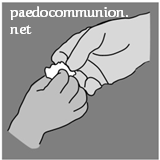Filed in:
Do You Hear what I Hear? (Psalms)
The Feeding of the Five Thousand in John 6 is, in part, formed by emphases from the Psalms of Ascent, especially Ps 132, where the Messiah is the Bread King of giving to the poor.
I contend that the Psalms of Ascent were indeed used at times of pilgrimage to festival. People give different explanations for their use, but one of the major views says that they were used on the way to the three annual festivals.
John’s gospel gives further reason to believe this, through two clues, the Lifting of Eyes, and the Bread King.
Looking Up
One thing characteristic of the Ascent is the lifting of eyes.
If these are pilgrim travelling songs for the ascent into the hills toward Zion, it would make sense that they should be lifting their eyes as they go up to Gods’ high place.
But only three places in all the Psalms talk of lifting eyes:
- PS 121.1 I lift up my eyes to the hills. From where does my help come? My help comes from the LORD, who made heaven and earth.
- PS 123.1 To you I lift up my eyes, O you who are enthroned in the heavens!
- PS 131.1 O LORD, my heart is not lifted up; my eyes are not raised too high; I do not occupy myself with things too great and too marvelous for me
These are all Psalms of Ascent.
In John 6.4-5, we hear:
Now the Passover, the feast of the Jews, was at hand. 5Lifting up his eyes, then, and seeing that a large crowd was coming toward him, Jesus said…
Jesus lifts his eyes, and sees the crowd. They are following him because he does famous miracles. But there are so many present, precisely because it is the season for pilgrimage. And if these pilgrims are singing, then the Psalms of Ascent would be what is on their minds and is in their hearts.
Maybe they had heard Ps 132 right before they got to the blessing of bread from David’s son.
The Bread King:
Ps 132, a Psalm of Ascent, talks about the blessing that will come from the coming king, the Christ, (anointed one) who will rise up from David’s line of sons. He will give bread to the poor. David was the one who brought the ark home, he found it in a field, and returned it to its resting place. David was seated there on his throne, the ark is the footstool of God’s throne. Here’s the Psalm with keys underlined, and then look at the explanation of John 6 after:
1Remember, O LORD, in David’s favor,
all the hardships he endured,
2how he swore to the LORD
and vowed to the Mighty One of Jacob,
3“I will not enter my house
or get into my bed,
4I will not give sleep to my eyes
or slumber to my eyelids,
5until I find a place for the LORD,
a dwelling place for the Mighty One of Jacob.”
6Behold, we heard of it in Ephrathah;
we found it in the fields of Jaar.
7“Let us go to his dwelling place;
let us worship at his footstool!”
8 Arise, O LORD, and go to your resting place,
you and the ark of your might.
9Let your priests be clothed with righteousness,
and let your saints shout for joy.
10For the sake of your servant David,
do not turn away the face of your anointed one.
11 The LORD swore to David a sure oath
from which he will not turn back:
“One of the sons of your body
I will set on your throne.
12If your sons keep my covenant
and my testimonies that I shall teach them,
their sons also forever
shall sit on your throne.”
13For the LORD has chosen Zion;
he has desired it for his dwelling place:
14“This is my resting place forever;
here I will dwell, for I have desired it.
15I will abundantly bless her provisions;
I will satisfy her poor with bread.
16Her priests I will clothe with salvation,
and her saints will shout for joy.
17There I will make a horn to sprout for David;
I have prepared a lamp for my anointed.
18His enemies I will clothe with shame,
but on him his crown will shine.”
John 6.2-15, the Feeding of the Five Thousand is end capped by Jesus, the son of David “sitting on a mountain” (vv.3, 15)
He and the people sit (vv. 3, 10 twice, 11), and they come to a resting place in a field full of grass (v.10),
Because he gives them bread, they want to make him king (v.15).
Since so much of the Ascending Psalms are used for this event AT passover time, we may assume, the Psalms of Ascent were indeed part of the backdrop of Passover celebration.



 Posted by saintluke
Posted by saintluke 


